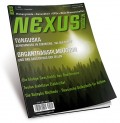Viele Empfänger verpflanzter Organe zeigen später Verhaltensweisen und Vorlieben, die nur von den Spendern der Organe herstammen können.
 Druckansicht
Druckansicht
Endnoten
- Lunde DT, „Psychiatric complications of heart transplants“ in Am J Psychiatry, 1967; 124:1190-1195
- Kuhn WF et al., „Psychopathologie in heart transplant candidates“ in J Heart Transplants, 1988; 7:223-226
- Mai FM, „Graft and donor denial in heart transplant recipients“ in Am J Psychiatry, 1986; 143:1159-1161
- Miller JG, Living Systems, New York: McGraw Hill, 1978
- Schwartz GE und Russek LG, „Dynamical energy systems and modern physics: Fostering the science and spirit of complementary and alternative medicine“ in Alter Therapies Health Med, 1997; 3(3):46-56
- Schwartz GE und Russek LG, „Do all dynamical systems have memory? Implications of the systemic memory hypothesis for science and society“ in KH Pribram (Hrsg.), Brain and Values: Is a Biological Science of Values Possible?, Hillsdale, NY: Lawrence Erlbaum Associates, 1998
- Schwartz GE und Russek LG, „The origin of holism and memory in nature: The systemic memory hypothesis“ in Frontier Perspectives, 1998; 7(2):23-30
- Schwartz GE und Russek LGS, „The plausibility of homeopathy: The systemic memory mechanism“ in Integrative Med, 1998; 1(2):53-60
- Sylvia C. und Novak W., A Change of Heart, New York, NY: Little, Brown, 1997
- Pearsall P, The Heart’s Code, New York, NY: Broadway Books, 1998
- Song LZYX, Schwartz GE und Russek LG, „Heart-focused attention and heart-brain synchronization: Energetic and physiological mechanisms“ in Alter Therapies Health Med, 1998; 4(5):44-63
- Russek LG und Schwartz GE, „Energy cardiology: A dynamical energy systems approach for integrating conventional and alternative medicine. Advances“ J Mind-Body Health, 1996; 12(4):4-24
- Tiller WA, Science and Human Transformation: Subtle Energies, Intentionality and Consciousness, Walnut Creek, CA: Pavior, 1997
- Russek LG und Schwartz GE, „Interpersonal heart-brain registration and the perception of parental love: A 42-year follow-up of the Havard Mastery of Stress study“ in Subtle Energies, 1994; 5(3):195-208
- Hameroff SR und Penrose R, „Orchestrated reduction of quantum coherence in brain microtubules: A model for consciousness“ in SR Hameroff, AW Kaszniak und AC Scott (Hrsg.), Towards a Science of Consciousness, Cambridge MA: The MIT Press, 1996
- Schwartz GER und Russek LGS, The Living Energy Universe, Charlottesville, VA: Hampton Roads Publishing, 1999


 Dr. Paul PEarsall ist als Professor in der Abteilung für Krankenpflege der Universität von Hawaii tätig.Neben über 200 wissenschaftlichen Artikeln veröffentlichte er auch 15 internationale Bestseller.
Dr. Paul PEarsall ist als Professor in der Abteilung für Krankenpflege der Universität von Hawaii tätig.Neben über 200 wissenschaftlichen Artikeln veröffentlichte er auch 15 internationale Bestseller. Dr. Gary E. Schwartz ist Professor für Psychologie, Chirurgie, Medizin, Neurologie und Psychiatrie an der Universität von Arizona. Er veröffentlichte bereits mehrere Bücher, darunter "The G.O.D. Experiments" von 2006.
Dr. Gary E. Schwartz ist Professor für Psychologie, Chirurgie, Medizin, Neurologie und Psychiatrie an der Universität von Arizona. Er veröffentlichte bereits mehrere Bücher, darunter "The G.O.D. Experiments" von 2006.
Kommentare
12. September 2013, 20:59 Uhr, permalink
Dirk
wirklich beeindruckend... bestätigt, dass das gehirn wenig mit unserem denken zu tun hat.. es dient nur als empfänger und je mehr es wächst, desto mehr kann es verstehen..
der geist sitzt demnach im gesamten körper..
ist alles übereinstimmend mit den büchern von donald walsch..
..
für mich ist klar, warum fleischfresser, so aggressiv sind... da ist man ein teil von im essen....
09. Januar 2019, 13:31 Uhr, permalink
marie-maru
Ich nehme an, Sie sind Vegetarier oder vegan und Ihr Kommentar beweist, dass auch Nicht-Fleischfresser aggessiv sein können. Anders kann ich mir diese aggressive und verachtende Ausdrucksweise nicht erklären. Selbst wenn Sie recht haben, so würde ein gelassener Mensch mit Achtung (auch Selbstachtung) nicht ein solches Wort wählen.
Übrigens habe ich eine fleischfressende Freundin, die mit Vorliebe Lammfleisch ißt - und sie ist sanft wie ein Lämmchen...
Kommentar schreiben